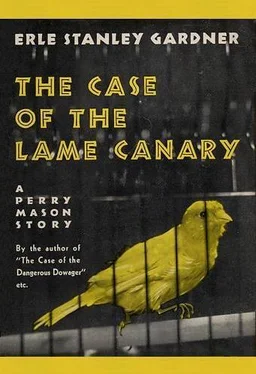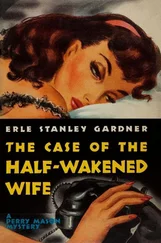Erle Gardner - The Case of the Lame Canary
Здесь есть возможность читать онлайн «Erle Gardner - The Case of the Lame Canary» весь текст электронной книги совершенно бесплатно (целиком полную версию без сокращений). В некоторых случаях можно слушать аудио, скачать через торрент в формате fb2 и присутствует краткое содержание. Город: New York, Год выпуска: 1937, Издательство: William Morrow, Жанр: Классический детектив, на английском языке. Описание произведения, (предисловие) а так же отзывы посетителей доступны на портале библиотеки ЛибКат.
- Название:The Case of the Lame Canary
- Автор:
- Издательство:William Morrow
- Жанр:
- Год:1937
- Город:New York
- ISBN:нет данных
- Рейтинг книги:4 / 5. Голосов: 1
-
Избранное:Добавить в избранное
- Отзывы:
-
Ваша оценка:
- 80
- 1
- 2
- 3
- 4
- 5
The Case of the Lame Canary: краткое содержание, описание и аннотация
Предлагаем к чтению аннотацию, описание, краткое содержание или предисловие (зависит от того, что написал сам автор книги «The Case of the Lame Canary»). Если вы не нашли необходимую информацию о книге — напишите в комментариях, мы постараемся отыскать её.
The Case of the Lame Canary — читать онлайн бесплатно полную книгу (весь текст) целиком
Ниже представлен текст книги, разбитый по страницам. Система сохранения места последней прочитанной страницы, позволяет с удобством читать онлайн бесплатно книгу «The Case of the Lame Canary», без необходимости каждый раз заново искать на чём Вы остановились. Поставьте закладку, и сможете в любой момент перейти на страницу, на которой закончили чтение.
Интервал:
Закладка:
“Was it a woman?” Drake asked, opening his eyes.
“He didn’t say,” Dr. Wallace remarked with dignity.
“Did Packard say what he planned to do in connection with moving the car?” Mason inquired.
“He said he was going out to take a look at it and see what could be salvaged.”
“Is Packard insured?”
“I gathered that he was not.”
“How long was he here?”
“Perhaps twenty minutes.”
“When he left, he was all right, was he?”
“Oh, quite all right — that is, except for these superficial cuts and bruises.”
“Did you,” Mason asked, “get Packard’s address?”
“Oh, yes. Just a moment and I’ll get it.”
Dr. Wallace consulted his file of card records, selected one, and read off an address, “1836 Robinson Avenue, Altaville, California.”
“That’s evidently his permanent address,” Mason said. “Did you find where he was staying here in the city?”
“No, I didn’t. I gathered that he was just passing through.”
“Did you gather that impression from a direct statement made by him, or simply because of what you—”
“Certainly not,” Dr. Wallace said, with dignity. “In my profession one does not rely upon inference except when it is absolutely necessary. I asked him when he had arrived here, and he said he had reached here this morning. That he had expected to be in San Diego by night.”
“You didn’t ask him where he’d stayed last night?”
“No, I didn’t. I failed to see that that would assist me in any way in reaching a diagnosis, or prescribing a treatment. You must remember, gentlemen, that my interest in the matter is purely from a medical standpoint. Incidentally, I may say that it was a matter which called for rather delicate handling. To have impressed upon Packard that he was a victim of amnesia would have caused a sudden fright which would have been a cumulative shock, superimposed, as it would have been, upon the shock incident to the accident. You see, gentlemen, in a motor accident, there is not only the shock resulting from the injuries, but there is that momentary realization of impending disaster which comes a fraction of a second before the actual impact.”
Mason nodded and said, “I understand. You haven’t any more information which might be of value to me, have you?”
“None whatever,” Dr. Wallace said, “other than that I may repeat, the man’s injuries were not serious. Doubtless you are representing an insurance company which—”
“No,” Mason said, “I’m not representing the insurance company. I’m interested, that’s all. You have Harry Trader’s address?”
“Yes. The Trader’s Transfer Company, 1819 Center Street.”
Mason said, “Thank you, Doctor. Come on, Paul, let’s go.”
Dr. Wallace followed them into the corridor, his manner suave, dignified and professional. “Good afternoon, gentlemen,” he said.
As they left the hospital and crossed to the automobile, Drake said, in his slow drawl, “Where does that leave you, Perry?”
Mason said, “I don’t know. I can’t tell very much about it until after I find out what’s happened at the Prescott residence. Right now I’m working pretty much in the dark.”
Drake said, “Well, I’ll call the office and get another earful.”
“I’ll wait here in the car,” Mason said. “Tell your girl to run in to my office and tell Della to wait for me.”
For some five minutes Mason reclined against the cushions of Drake’s car, smoking thoughtfully, then he raised expectant eyes as Drake came running down the white stone steps of the big building. “Anything new?” he asked, as Drake opened the door of the car.
“I’ll say! Plenty of news. The homicide squad was playing around the Prescott house because Walter Prescott was found dead in an upstairs bedroom. He was fully clothed for the street, and somebody had plugged him right through the brisket with a .38 caliber revolver. Three shots were fired. All of them took effect. One of them went through the heart. The shots must have been fired at close range, because there were powder bums on the clothing and skin. The cops searched the drawer in the desk where Mrs. Anderson had seen the Swaine girl planting the gun. They didn’t find any gun in the drawer, but back of the drawer, where it had been shoved down into a little recess in the desk, they found a .38 caliber Smith & Wesson revolver, with three empty cartridges in the cylinder, and three loaded shells. The smell of the gun shows it had been recently fired.”
“How about the Swaine girl?” Mason asked. “What are they doing about her?”
“They’re looking for her. She left the house around two-thirty, carrying a suitcase and a caged canary. Police figure she intended to skip the country and didn’t want to leave the canary in the house to starve.”
“In that event,” Mason pointed out, “she must have felt certain her sister, Rosalind Prescott, wasn’t going to return.”
“The police are looking for the sister, too.”
“Any luck?”
“None so far.”
“They’ve identified the man who was at the house?”
“Yes. A chap by the name of Driscoll. They’re looking for him.”
“Find him?”
“I don’t think so. Not yet.”
“Put a couple of men on the job digging out all the information you can about Driscoll,” Mason ordered.
Drake’s carp-like mouth twisted into a slow grin. “I saved a nickel on that one,” he said.
“What do you mean?”
“I started a couple of operatives on him as soon as I had the name over the telephone, so I won’t have to call back.”
Mason nodded and said, “Get in, Paul. We’re going to hunt up Harry Trader. We’ll try his place of business first. He may be there.”
Harry Trader, a barrel-chested individual, with the odor of stale perspiration and tobacco clinging to him, was still in his office, making out some reports. He surveyed his two visitors with cold, gray eyes.
“Just where do you two guys fit into this picture?” he asked.
“We’re making an investigation,” Mason told him.
Trader slipped a plug of tobacco from the pocket of his stained overalls, cut off a slice and inserted it in his mouth. With calm deliberation, he replaced the tobacco, shut the knife, and shoved it down deep in his pocket. “Yeah,” he said. “When a guy starts asking questions, he’s making an investigation. That don’t mean anything. Are you representing Packard?”
“No, I’m not,” Mason said. “I’m investigating another angle of the case.”
“Which angle?”
Mason said, “An angle which is quite incidental.”
Trader rolled the piece of tobacco about in his mouth through tightly clenched lips, and said, “Uh huh. Thanks for tellin’ me.”
“Did you take Packard to the hospital?” Mason asked.
“Yes.”
“Did you take him out of the hospital?”
“No. I had a delivery to make. I turned him over to the doctor.”
“You don’t know when he left?”
“No.”
“You don’t know how seriously he was hurt?”
“Sure. He was just banged up a bit. I stuck around until I was sure there was nothing wrong with him.”
“Was he suffering from amnesia — loss of memory?”
“He was punch-groggy, if that’s what you mean.”
“How did the accident happen?” Mason asked.
Trader adjusted the piece of tobacco between his molars, chewed with a barely perceptible motion, his facial muscles bunching into little knots as his jaws clamped shut. His eyes were cold and uncordial. On the wall, a clock clacked off the seconds.
“You’re not going to answer that question?” Mason asked.
“You said it, buddy. I’ve made my report to my insurance company. Go talk with them if you want to.”
Читать дальшеИнтервал:
Закладка:
Похожие книги на «The Case of the Lame Canary»
Представляем Вашему вниманию похожие книги на «The Case of the Lame Canary» списком для выбора. Мы отобрали схожую по названию и смыслу литературу в надежде предоставить читателям больше вариантов отыскать новые, интересные, ещё непрочитанные произведения.
Обсуждение, отзывы о книге «The Case of the Lame Canary» и просто собственные мнения читателей. Оставьте ваши комментарии, напишите, что Вы думаете о произведении, его смысле или главных героях. Укажите что конкретно понравилось, а что нет, и почему Вы так считаете.












